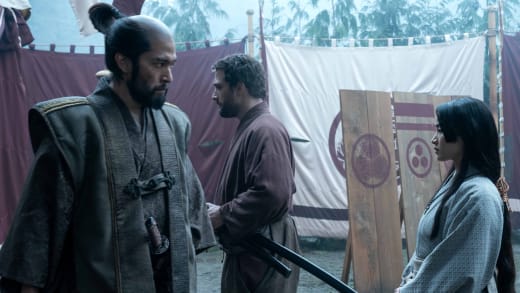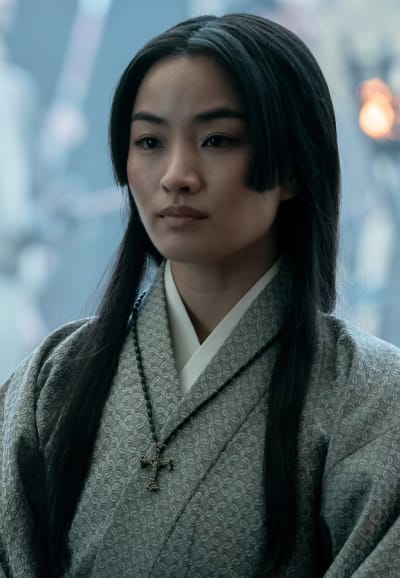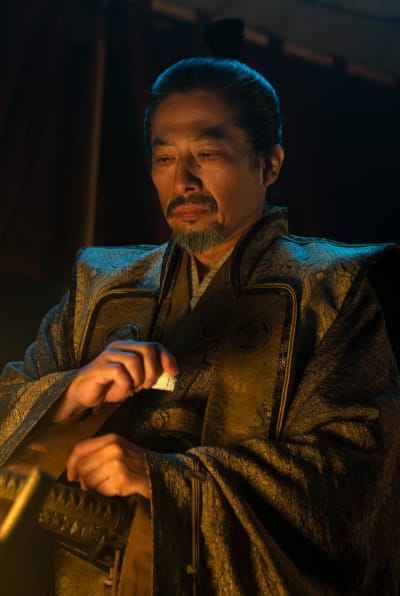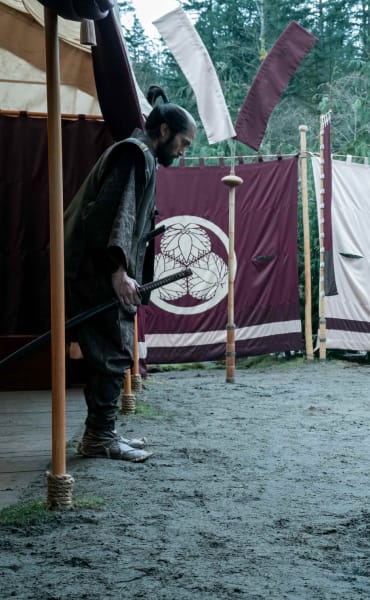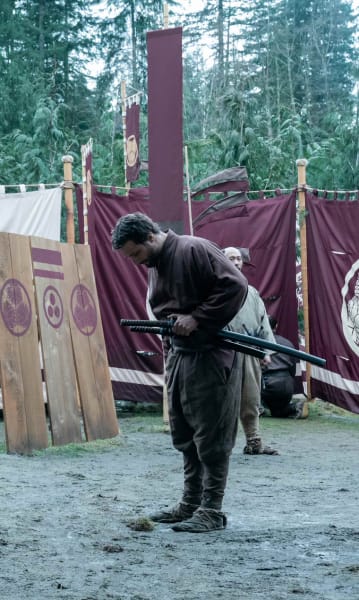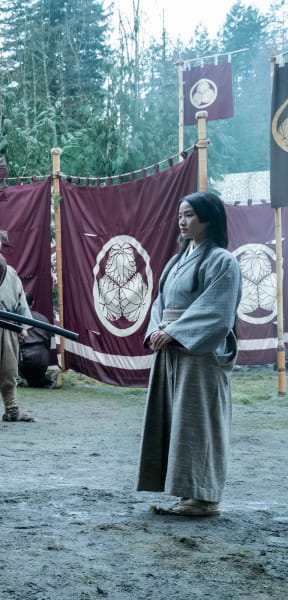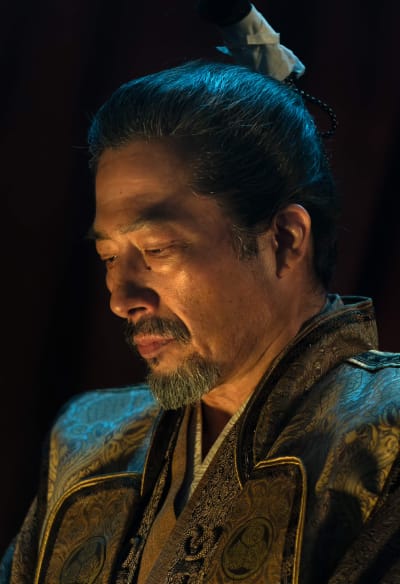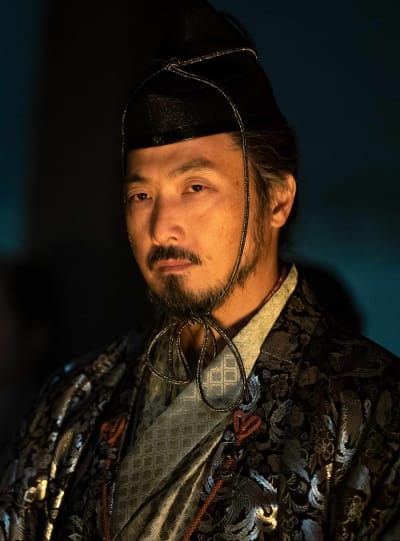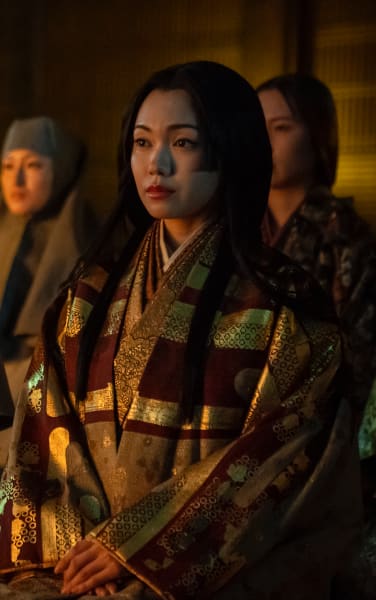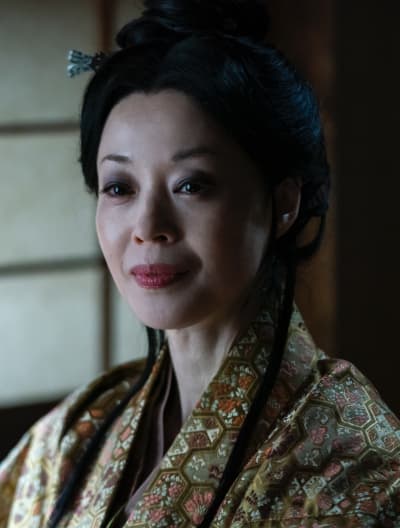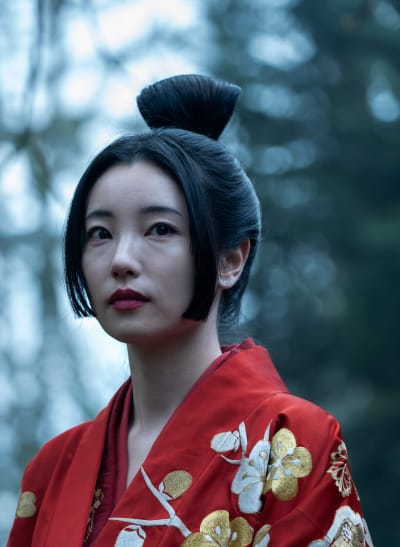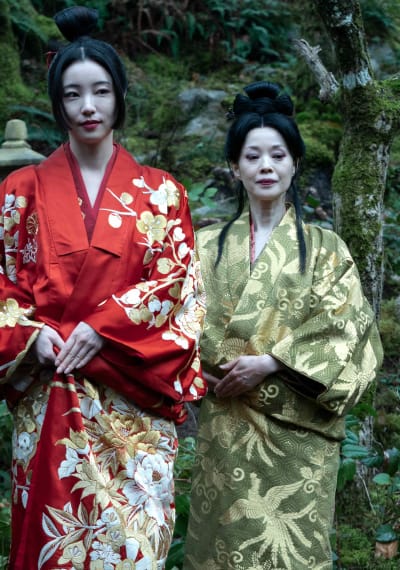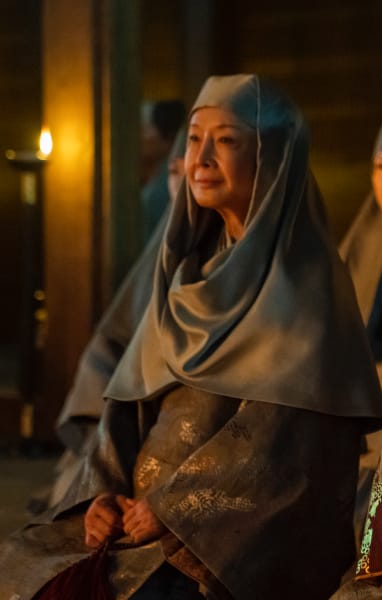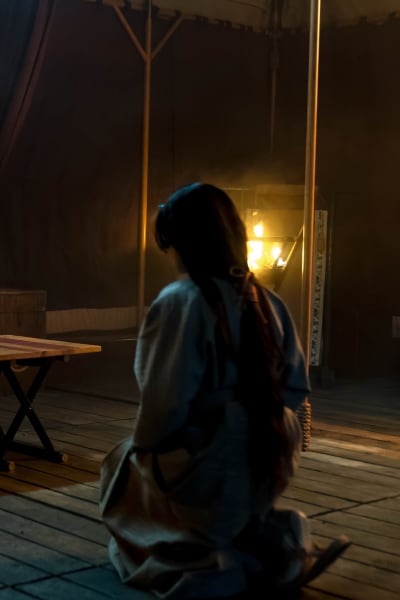[ad_1]
From the second that John Blackthorne and his crew (somebody ought to actually test on these guys!) ran aground within the fishing village of Ajiro, Shogun has seldom allowed its viewers a second to catch their breath.
So it got here as a little bit of a reduction when the present slowed issues down slightly in its fifth episode, Damaged to the Fist.
The intricate political maneuvering and the gorgeous motion set items are thrilling, in fact, however the most effective dramas know that coaxing viewers to genuinely care about your characters is the easiest way to lift the stakes and remodel these battle and earthquake scenes into the stuff of white-knuckle panic.
Pulse-pounding boat races and shock cannon assaults may generate essentially the most next-day buzz, nevertheless it’s in its quieter moments that Shogun distinguishes itself as one of many premiere dramas on TV.
So when Girls of the Willow World opens with a 22-year flashback, we appropriately assume that we’re in for extra of the character-defining backstory that made the earlier installment so memorable.
And we could not be happier about it.
This time, the main focus is on Mariko’s painful previous — and the loss that continues to tell so a lot of her actions and selections.
We knew that her youth had been marred by violence and trauma, however solely now do we now have a full sense of the horrors — together with her organized marriage to Buntaro — that formed her into the wounded warrior that is made such an impression on Blackthorne.
The glimpse into Mariko‘s previous helps to clarify the facet of her character that the Anjin finds most obscure — particularly, her dedication to responsibility above all else.
Talking of Blackthorne, again within the current, the manic Brit is climbing the ladder like no one’s enterprise.
Following one more rousing speech about demise, responsibility, and dishonor (he excels at these), Toranaga tells his troops that Blackthorne has as soon as once more saved his life and shall be duly rewarded with a fiefdom of his personal.
He is additionally been made basic of the cannon regiment, which most likely would’ve been a sensible transfer from the get-go.
The scene is most noteworthy for Blackthorne’s ascendancy and the ire it is incomes him amongst Toranaga’s males, nevertheless it’s additionally attention-grabbing for Toranaga’s remarks about discovering that means in each demise — strains that recall to mind the ill-fated gardener from final week’s episode.
Omi is amongst those that are livid with the barbarian’s rise to energy, however his often ornery uncle, Yabushige, is worried a few bigger matter:
Because of the earthquake, Ishido’s troops now vastly outnumber Toranaga’s. Not ultimate!
The perfect villains are those who appear real of their conviction that they are the hero, and Shogun excels at depicting ethical ambiguity and the type of self-delusion that always lurks behind abhorrent acts.
Take, for instance, the trade by which Buntaro reveals to Toranaga that he thinks he is a stand-up man for sparing Mariko’s life and marrying her.
The man is shocked — shocked! — that she’s no more excited for the chance to reside with an abusive jerk who’s without end dredging up recollections of her horrific previous.
Sure, Buntaro may not be essentially the most empathetic soul on the planet — however to his credit score, he acknowledges the chemistry between his spouse and the Anjin.
There is a tense second because the rivals cross paths outdoors of the principal’s workplace (Toranaga’s hut), and we grow to be extra sure than ever that considered one of these guys is gonna kill the opposite.
Although he is grow to be conscious of the significance of etiquette throughout his time in Japan, Blackthorne dangers infuriating his host by reminding him that he isn’t terribly involved with fiefs or regimental instructions — he simply desires his ship again.
He gives to sweeten the deal by attacking the Black Ship, however each Toranaga and Mariko balk on the thought of open hostility with Portugal.
The three-way trade makes for a superb scene that underscores the ability with this present balances the non-public and political.
Toranaga and Mariko are open about their distaste for Blackthorne’s proposition, whereas their private grievances in opposition to him proceed to simmer simply beneath the floor.
Toranaga is aware of there’s one thing happening between Mariko and Blackthorne as a result of — properly, Toranaga is aware of nearly all the pieces.
However is he conscious of the torment he is inflicting her when he asks her to set the Anjin up with the village’s best courtesans and intercept his pillow speak?
Once more, in terms of Toranaga, the most secure assumption is all the time that he is aware of precisely what he is doing.
Talking of intricate maneuvering, Ishido has used a false menace in opposition to the Inheritor’s life to lock down Osaka Fortress and maintain his potential enemies hostage.
One of many solely instances that this present feels a bit overextended in its plot ambitions is after we’re reintroduced to characters (Hiro-matsu, Father Alvito) whom we have not seen in a number of episodes, and we really feel like we’d like an expository reminder of their ambitions and allegiances.
Typically we get the information we’d like straight away, and typically we do not, however we by no means get the sense that we’re falling behind.
This time, we’re introduced up to the mark by two successive forays into the previous.
First, a dialog between the monks fills us in on Ochiba’s previous and reminds us of Toranaga’s noble lineage.
That is adopted by one other horrific flashback as a younger Ochiba is knowledgeable that her father has been murdered and he or she should flee.
Then, in a scene straight out of Shakespeare, she and different disgruntled residents of Osaka grumble about their circumstances as they watch a play involving characters from their very own drama.
The 2 portrayals of Ochiba — the one on stage and the one scene in flashback — mix to create a robust impression:
She’s a lady who has endured a substantial amount of ache, amassed an unimaginable quantity of energy, and is harmful due to each.
The feminine characters of Shogun — and their previous traumas — loom massive over this episode, revealing depths to the narrative that had been solely hinted at earlier than.
Each Mariko and Ochiba have been compelled into uncomfortable positions involving the sexual wishes of highly effective males, and each know that they’ve little selection however to try to flip these situations to their benefit.
In a case of artwork imitating life, Ochiba “seduces” Ito, the actor who performed the late Taiko on stage, and he or she and Ishido persuade him to hitch the Council of Regents and vote for Toranaga’s demise.
We’re reminded as soon as once more that she actually, actually hates Toranaga, and we’re left questioning if he is as a lot man as we have been led to imagine.
Actual life, in spite of everything, just isn’t so simple as a short morality play honoring one’s predecessors.
Toranaga may even be questioning his personal character, as his advisors urge him to pursue Operation Crimson Sky — a full assault on Osaka with the purpose of eliminating the council and making Toranaga Shogun.
Sure, it is the titular line! A lot sweeter for the way lengthy we needed to look ahead to it!
Toranaga is as soon as once more dissatisfied by his massive grownup son, and he insists that he has no intention of searching for the title of Shogun. We’ll see about that.
In the meantime, Mariko is compelled to endure the indignity of bargaining with a madame for Blackthorne’s night companionship.
Mariko may not respect Gin’s sly smile and insinuations about her relationship with Blackthorne, however she maintains her regular veneer of professionalism.
And to be truthful, the insinuations are correct — so Mariko has little trigger for criticism.
Additionally utilizing his invaluable brothel time to emphasize in regards to the barbarian is Omi.
He cannot perceive why Toranaga is so bullish on Blackthorne, and apparently, “as a result of dude saved his life twice and may now assist him win a conflict” is not a ample clarification.
With that, it is lastly time for Mariko and Blackthorne’s awkward encounter with Kiku.
The courtesan’s philosophical strategy to her work reminds us that it is a way more conscientious tradition than the one from which Blackthorne hails.
Mariko is without end urging her barbarous cost to take that under consideration, and in a twist of irony, it is solely when she encourages Blackthorne to get pleasure from the expertise for her sake that he endeavors to take action.
Blackthorne’s expertise usually mirrors our personal as viewers, as feudal Japan is without end revealing new depths to him, simply as Shogun steadily exhibits itself to be excess of it initially appeared.
The place I come from, prostitutes are neither this properly introduced, nor as inquisitive.
Blackthorne
An encounter with a prostitute that appears as if it can supply little other than comedian reduction transforms into one thing rather more profound, as Kiku explains her vaunted place in society.
As is so usually the case with this sequence, the scene is richly layered: The ache that Mariko speaks of in translation is her personal, and the will Kiku describes makes Blackthorne lengthy for his translator, not his courtesan.
And in one other ironic twist, Mariko’s clipped translation of Kiku’s morning-after reward speaks volumes about her emotions towards Blackthorne.
From there, we be taught that Mariko is valuabe to Toranaga not solely as a translator and procurer — he is aware of of her childhood friendship with Ochiba, and he seeks to make use of her data of his enemy to his benefit.
In her dialog with Toranaga, Mariko spells out the episode’s themes, however fortunately, she stops simply wanting placing too positive a degree on it.
Mariko: A person might go to conflict for a lot of causes: conquest, satisfaction, energy. However a lady is solely at conflict.
It is becoming that that is essentially the most nonviolent episode of Shogun to this point, because it focuses on a distinct form of conflict — the type waged by ladies like Mariko, Ochiba, Gin, and Kiku.
Their battles are fought with phrases, and delicate gestures. Their weapons are their attraction, their tact, and their data of the boys round them — those who may profit them, in addition to those who want them hurt.
However for all of her understanding of the world round her, Mariko was unaware of her father’s intentions in marrying her off to Buntaro. Toranaga assures her, nevertheless, that her private conflict is much from over.
In a task reversal that additionally does a lot for example this episode’s central themes, Ochiba chides Ishido and as soon as once more takes us again to Azuki Fortress — this time, with the purpose of explaining her hatred for Toranaga.
She believes he plotted her father’s demise — a risk that Ishido clearly by no means thought of as a result of he was too distracted by the bombast of the masculine world to listen to the whispers that had been taking place behind closed doorways.
Ishido foolishly suggests a public answer to the issue, and Ochiba regales him with the story of her harrowing rise to energy that is as chilling as any act of swordsmanship we have witnessed to this point.
Sadly, Ishido learns from Ochiba’s delicate strategy — when he slaughters Sugiyama and his whole retinue, he does so surreptitiously and blames on bandits.
Clearly, along with his again in opposition to the wall and his want to maintain his Ochiba as his ally rising stronger by the day, Ishido is extra harmful than ever.
And the ever-observant Toranaga can learn the writing on the wall.
However whereas his maneuvering has led Toranaga to his present place of energy, he acknowledges that the time for diplomacy has handed, and it is time for Crimson Sky.
This episode of Shogun went in the other way, eschewing violence and indulgent motion set-pieces in an effort to reveal that the sequence can accomplish simply as a lot with dialogue as it could with swords.
What do you assume, TV fanatics? Does Shogun hold getting higher with every passing week? Hit the feedback part under to share your ideas.
Tyler Johnson is an Affiliate Editor for TV Fanatic and the opposite Mediavine O&O websites. In his spare time, he enjoys studying, cooking, and, in fact, watching TV. You’ll be able to Observe him on X and e mail him right here at TV Fanatic.
[ad_2]


